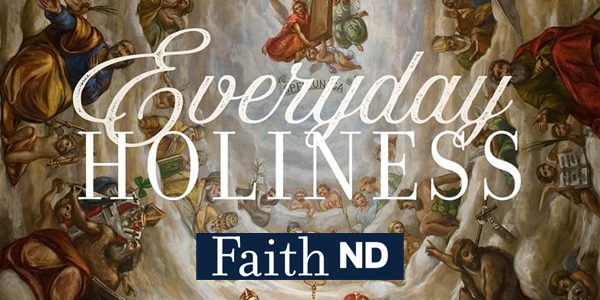What happens after death? Can we repent after judgment? Will our bodies matter in eternity? And do animals have a place in the life to come?
To celebrate the 800th anniversary of Thomas Aquinas’s birth, the Jacques Maritain Center convened three distinguished scholars for a dynamic conversation on eschatology, the soul, and the nature of divine love. Drawing deeply from Aquinas’s writings, the panel explored some of the most enduring —and pressing— questions about human destiny.
Fr. James Dominic Rooney – Postmortem Repentance and the Fixity of Will
Fr. James Dominic Rooney of Hong Kong Baptist University opened with a challenging claim rooted in Aquinas’s anthropology: after death, repentance is no longer possible. In the disembodied state, Rooney explained, the soul attains a kind of angelic clarity—its self-knowledge becomes luminous and fixed. Because no new relevant information arises and the will is fully exposed to itself, one’s orientation toward or away from God becomes final. Rather than arbitrary, this fixity reflects both divine justice and the soul’s freedom. Rooney’s paper addressed common critiques that such a doctrine portrays God as unmerciful, and clarified Aquinas’s belief that postmortem obstinacy is the result of transparent, fully chosen desire.
Dr. Catalina Vial – Embodied Joy and the Beatific Vision
Dr. Catalina Vial of the Pontifical University of the Holy Cross turned to the nature of the beatific vision, responding to critiques that Aquinas presents too intellectualized a view of heaven. Vial argued for a holistic and christological reading of Aquinas: that final union with God involves not just intellect, but the entire human person—will, affections, and glorified body. She emphasized that charity on earth shapes our capacity for heavenly glory, and that Aquinas’s eschatology, properly read, resists the charge of spiritual reductionism. The glorified body, far from being an afterthought, fully participates in the joy and radiance of divine life. In this vision, heaven is not sterile contemplation, but a transformative and communal reality suffused with love.
Dr. Jennifer Hart Weed – Animals and the Fittingness of Cosmic Renewal
Dr. Jennifer Hart Weed of the University of New Brunswick offered a creative and bold proposal: that Aquinas’s own principles of fittingness may open the door to the inclusion of animals in the glorified creation. While Aquinas held that animals, lacking rational souls, do not persist after death, Hart Weed reexamined this claim through his broader metaphysical framework. If divine goodness is superabundant and the new creation aims at cosmic perfection, she argued, it may be fitting for non-rational creatures to be restored in some transformed way. Drawing on Scripture and Thomistic logic, she proposed that glorified animals could manifest God’s generosity—not primarily for human enjoyment, but as part of creation’s full redemption.
A Living Dialogue with Aquinas
Hosted by Fr. Matthew Hovde, the event was marked by intellectual generosity and imaginative rigor. Questions from the audience drew out themes of angelic will, the resurrection of the body, and the continuity of personal identity. Rather than treating Aquinas as a static authority, the conversation presented him as a living interlocutor—capable of guiding fresh inquiry into what it means to love, to choose, and to hope for more.

